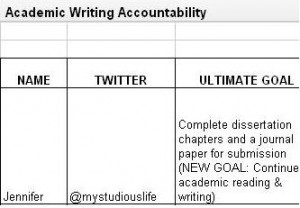In the second of two posts about Writing Accountability (the first of which introduces the initiative and you can read about here), Jennifer Lim explains how writing progress can be effectively measured and managed. Jennifer’s post is part of PhD2Published’s new Academic Writing feature.
For accountability to work, measuring and monitoring progress are essential too the writing process. Monitoring your own progress helps in recognizing current productivity status and finding ways to improve it. Setting an ultimate goal and daily writing plan to achieve it is important for improving writing productivity. Progress measurement is of great interest to me. As there is no strict rule about how writing progress should be measured, in the Writing Accountability initiative, I find it amazing that everyone has different ways of measuring their personal progress. Here are some examples of how to measure writing progress in order to develop accountability.
Word Counts/Targets
Although some measurements are similar, there are still many different ways of doing it. The most practical method is word count. Whether the final writing achievement is a few thousand words of an article or more than 10,000 words of a dissertation or thesis, word count is the best way to measure and monitor writing progress towards an ultimate writing goal. It is also best to break down the ultimate writing goal into smaller daily goals. Let’s say you need to write at least 12,000 words in 6 months and that most probably you do not plan to write over the weekend. This equates to at least 100 words per day in order to achieve 12,000 words in 6 months. By having this daily writing goal of 100 words, you have a clearer writing plan to help to achieve the ultimate goal and can diminish the overwhelming feeling that a larger word count often creates. If writing 100 words a day is too easy, set it higher or to a limit that you feel is challenging enough to motivate you to write daily.
Time Measurement
Writing is not the only thing one does as an academic however. A lot of time is also spent on reading, making notes, data collection and data analysis etc. Should we not measure those that actually contribute too the final product of our writing? What is the best way to measure these? I personally think the daily time spent on these activities should also be considered. This helps to minimize the feeling of unproductiveness if no significant words are written on those days when other academic activities take precedence. So, another good way to measure daily progress is the total time spent. Set a minimum time that you are willing to spend on a daily basis to work on your academic activities, including reading, literature review, etc. Your time target should be reasonable and something that you can achieve such as 1 or 2 hours a day. Setting a target too high will only decrease your motivation if you can’t achieve any at the end of each day.
Combining the two
It is viable to combine both word count and time spent measurements as the daily goal. In that way, you can measure word count when you are writing and time spent when you are working on other relevant academic activities. I also find it is beneficial to record daily progress together with some comments about what has been achieved or lack thereof so reflection is possible for self improvement. Another example of measurement is from Sarah Ford (who Tweets as @Sarah_M_Ford). She has a unique formula of calculating ‘score’ to measure her daily progress (learn more about it here).
Other than using the spreadsheet for progress update in writing accountability, there are also some #AcWri enthusiasts who like to blog or tweet about their writing goals and progress. The #AcWri community on Twitter provides great peer support where people are sharing writing advice and encouraging one another in the writing process. If you work better with pressure, the #AcWri community can also act as (positive) peer pressure. Seeing others progressing well when you are not provides encouragement to improve your own productivity. Either way, participating in the #AcWri community will only benefit your progress and increase your motivation. Knowing you are not alone in whatever obstacles you are facing provides good solace. The key to accountability is: knowing what you need to achieve and making sure you put in the effort to achieve it. Regardless of how you measure your progress, all you need to do is to find the best way to achieve the ultimate goal by setting targets that are reasonable and achievable.









